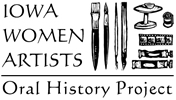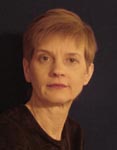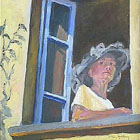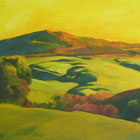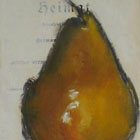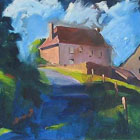VICKI INGHAM
artwork | audio | statement | 2008 update | galleries
artwork
audio 
- My Mother (34 sec. | 270KB): listen | read
- Making Stuff (26 sec. | 206KB): listen | read
- Turnaround (58 sec. | 457KB): listen | read
- My Artwork (44 sec. | 347KB): listen | read
- Response (44 sec. | 349KB): listen | read
- Why Make Art? (55 sec. | 437KB): listen | read
artist statement
With Italian landscapes, my goal is to capture the fleeting effects of light and shadow on the land. I especially love the copper and golden light of a low sun and long cool shadows. In Tuscany, the musical harmonies of the landscape and the forms of the interweaving hills, velvet-covered and muscular, are a constant source of inspiration and challenge. In painting the medieval Italian towns, I look for patterns of light and shadow created by the architecture.
Iowa landscapes offer big skies and simple vistas that can become dramatic with light and shadow.
Regarding the figurative paintings, several years ago I began using myself as a model and painting myself in vintage clothes in interior settings or in places I had visited on vacation. It started as an interesting challenge, and I liked the generally nostalgic atmosphere that resulted. The painting implies a story, but I leave it to the viewer to supply it.
2008 update
In some ways not much has changed for me. I live in the same apartment, I work at the same company, probably doing much the same type of thing, editing decorating books. I'm still painting in oil. But a couple of things have changed. I came to terms with accepting myself as an artist and believing in that as my calling, whether I sell anything or not.
There are so many of us out here making art, and it's hard sometimes not to feel overwhelmed and lost in the crowd, but I have to keep believing that we each have our calling, our gift, and the responsibility to use it. I keep making art because I need to. It's part of who I am. I want and need to sell what I produce for financial reasons, but finding buyers is also the other part of the conversation—I'm putting it out there, and I need someone to respond. It's really a gift when people like your work enough to want to live with it.
I started focusing on Italian landscapes in 2003, when I discovered Poggiarellino, the wonderful farm in Tuscany where I've stayed four times. Unfortunately, the market for my landscapes disappeared in 2007, so the only things that have been selling in the last year are my pears. Fortunately, I've been finding ways to keep the subject interesting, and I am very grateful that people do seem to really respond to them.
I started doing self-portraits about 5 or 6 years ago, probably part of my midlife process of self-rediscovery. It was a fun challenge, and I painted myself into various tourist spots I'd been to or in vintage clothing. Recently, I began painting my sister, mother, stepsister, and myself from photos I've taken. We're in costume, posed, and the effect is...interesting. I'm not sure where it's going, but striving for some degree of mastery over the figure is an intriguing challenge. I also have this idea about the archaeology of memory that I'd like to explore, but am not sure how to get at it.
I finally have a website and am trying to figure out how to use the internet to find a wider audience.
audio text
My Mother
All the women in my family are very strong, independent women. They don't necessarily want to be that way, but that's what life hands them. My parents divorced when I was nine. We spent the summers with my father, my sister and I. But my mother's really responsible for raising us and getting us through college. She took early retirement, but she has spent the last twenty years or so just doing all kinds of volunteer work, exploring aspects of her personality and her life and her interests. She liked to draw when she was young. She wanted to be a fashion designer. But she never went anywhere with it. But now, she goes to oil painting classes every week.
Making Stuff
The whole time we were growing up, I think I always liked arts and crafts. I started drawing in fourth grade and the reason I remember is because that's when I got interested in horses, when all little girls get interested in horses, and I started drawing horses all over the place—on my desk, on papers, everywhere. And then I just got into drawing from that. I would make my own stencils and make greeting cards. I just was always making stuff, you know?
Turnaround
At the University of Alabama at Birmingham, I took three or four studio courses, in the late seventies—started trying to do something academic with the art. Then I got the job at Southern Living and I didn't have time to take night courses. And so I would do things on my own. I'd go to the zoo and sketch from life. I had a hard time bringing things to completion. I really did do more in the way of workshops and classes as an adult living in Birmingham. And the job I did, it was creative.
But the real turn around for me was, in 1992 I went to Italy for a month and did a landscape painting workshop, and did nothing but draw and paint every day for a month. And it was like, okay, either do this and be serious about it, or just quit. None of this waffling back and forth like I've been doing for my entire life. Then when I moved up here and was able to get into the gallery, that gave me an incentive. Then I started selling there, and then a gallery in Birmingham picked me up. So it has become more of a profession.
My Artwork
I think it's very conventional. But I'm grateful there are enough people who like it that will buy it that I can keep painting.
I love the light—the light is what makes things interesting to me, and that is what I want to capture and convey. I love the texture and smell of oil paint, and the feel of it—I just love working with it. When I can get something that I feel happy with, it makes me feel good about myself. And if I can't get happy with it, it drives me crazy.
My interest in finding patterns created by light and shadow has become much more focused since I've been painting consistently. And I would love to move into more abstracting those patterns and getting away from such concrete, but it's hard to make myself give up the concrete.
Response
You make something, and what I see that I like in something is never what anybody else sees that they like. When I listen to people talk about what they like or what they see in my paintings, it's because it reminds them of someplace they've been or it looks like someplace they know. Or it tells them a story—I mean it's all this narrative, anecdotal stuff that I didn't have in mind (laughing), but that's what people latch on to. So you have no control over it. You put it out there, and they see what they see.
This one man who bought five of my paintings in Birmingham said that there's one I did that makes him feel so peaceful. When he's in his office, he looks at this painting and he just feels like he's in another world. He can walk right into that room and feel peaceful. And I thought, Well that's really cool. I like that. That's nice!
Why Make Art?
When I can produce something that I feel good about, it makes me feel good about myself. The act of creation—and that's one thing I like about writing, too, is that—it's a struggle to work through the story, but when you have something that flows and works well, you have something to show for your time. And I'm very task-oriented, and product-oriented. So when I have a painting that I'm happy with, it's sort of like a justification of my existence.
I think most people go through slumps. I'll reach a point where I'll think, what is the point of all this? Why am I doing this? Does the world need any more paintings? So I question the validity of the enterprise from time to time. But I get over it—so far.
I have a hard time claiming the title of artist for myself, because to me an artist is someone who works with ideas, it's more conceptual. I'm willing to call myself a painter. But it gives me an identity and a sense of self. It's tied up with who I understand myself to be.
